The Setting:
v Tuesday at the McCullough/Coppler nut house.
v Downtown Lexington.
v March madness in Kentucky (“mad” in so many ways) .
The Action:
o Sara’s been Spring cleaning:
o Lucy’s been power lounging:
o Ralph is equally engaged:
o I’ve been busy not yet unpacking
The Problem:
v Sara suggests I dig into my memoir.
(But I don’t know where to begin, since my crazy past (insane in the most literal sense) is stored in boxes, stacked in piles.)
o Video-taped therapy sessions:
o Journals—30 year’s worth, at least. Here’s one small sample from 1997:
o Psychiatric records, both in-patient and out —a peak at my oh-so-less-than-sane self:
The Interpretation:
v I’m scared out of my mind!





















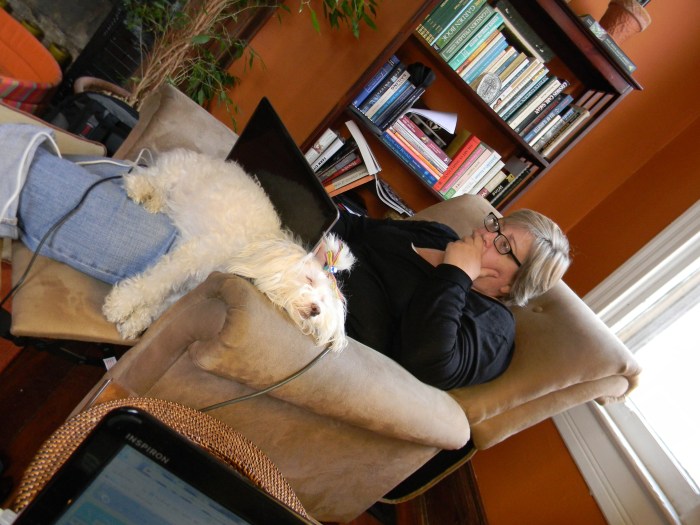
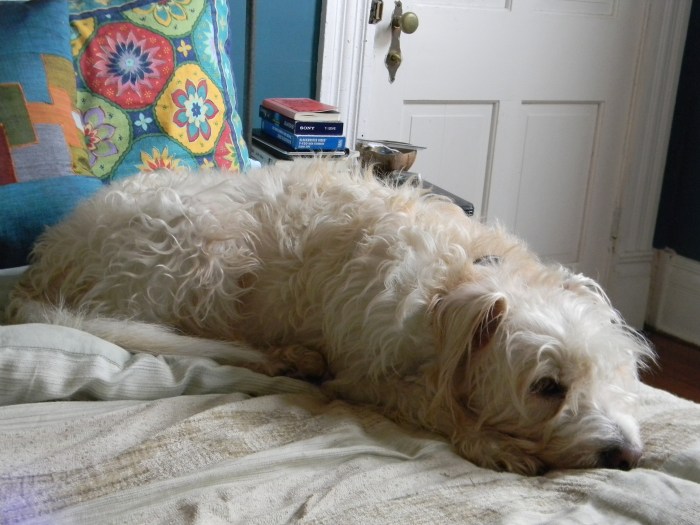
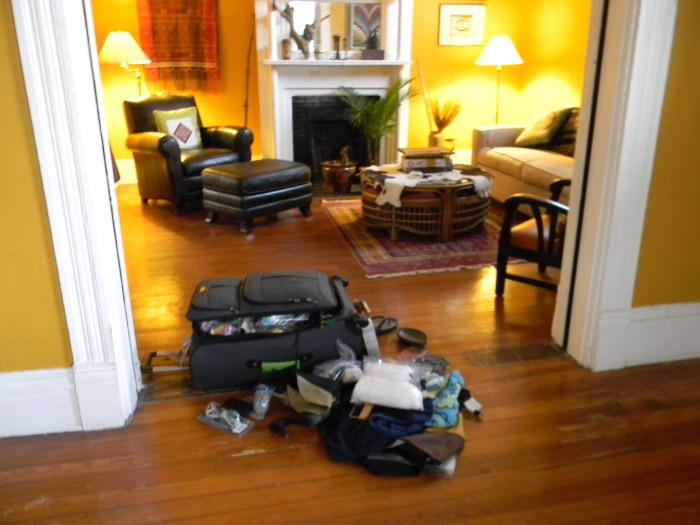
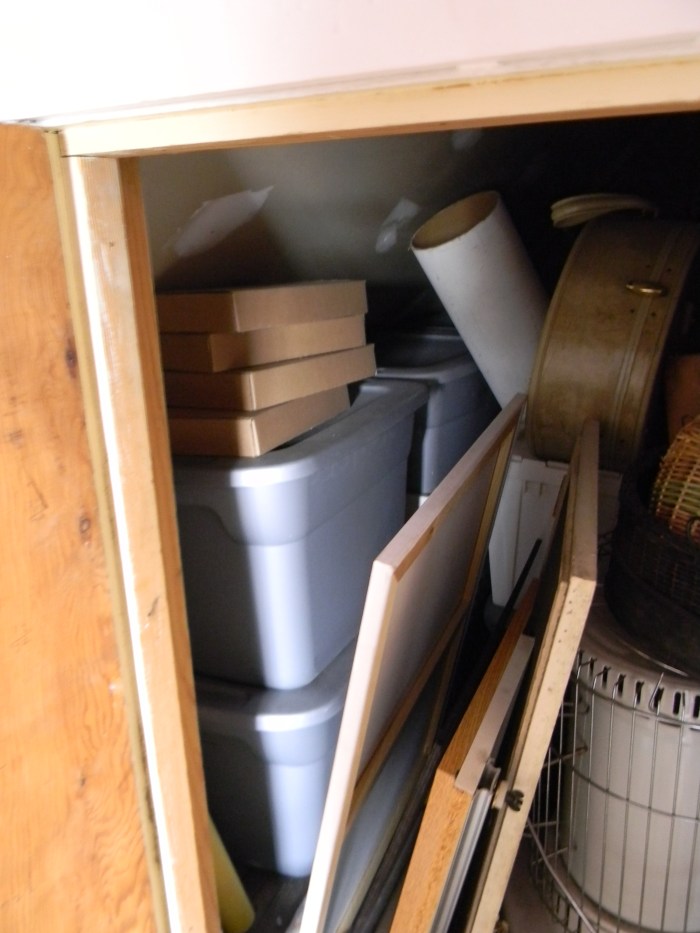
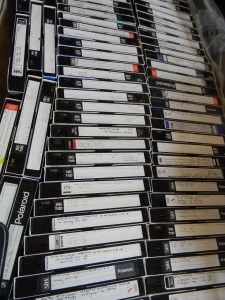
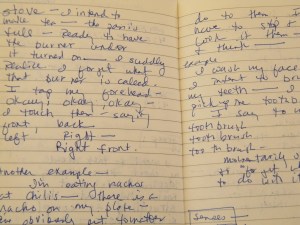
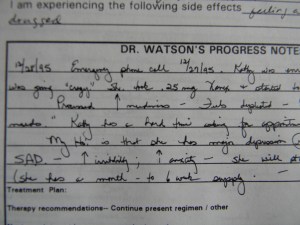
I say don’t try to make sense out of it all. Take a deep breath and write the first sentence that pops into your head. See where that one sentence leads. Use your records, etc the way you use Google (as a reference,) rather than trying to absorb it all and writing from that. When you start, magic will happen.
LikeLike
I will try that. You may be right that I’m wasting too much energy thinking about it and not enough doing! I write those first sentences this morning, no matter how good or bad. I believe in the magic, the eventuality of it, the inevitability of it. Thanks, Renee!
LikeLike
Ralph & Lucy have the right idea! Has Sara relaxed at all since you’ve been home?
LikeLike
Excellent question, Lisa. And the answer is no–she hasn’t. Though today she has a horrible headache, so that may force her to stop doing and just allow herself to be.
Isn’t it funny how the dogs manage to get it right!
LikeLike
Yep, just get started somewhere anywhere, write the first sentence…. you can do it!
LikeLike
Thanks for the encouragement, Elizabeth! You know that’s what I tell my students, but for some reason, it seems so hard to follow my own advice. Why is that?
LikeLike
I totally hear you! Actually, Kathy I meant to share this great quote with you awhile back when you wrote your post “Fear and Trembling in the New Year: a Writer’s Confession”
“the great German novelist Thomas Mann said that a writer is someone for whom writing is more difficult than it is for other people. The best writers write much more slowly than everyone else, and the better they are, the slower they write. James Joyce wrote Ulysses, the greatest novel of the 20th century, at the rate of about a hundred words a day—half the length of the selection I read you earlier from Heart of Darkness—for seven years. T. S. Eliot, one of the greatest poets our country has ever produced, wrote about 150 pages of poetry over the course of his entire 25-year career. That’s half a page a month. So it is with any other form of thought. You do your best thinking by slowing down and concentrating.”
http://www.theamericanscholar.org/solitude-and-leadership/
so I know you can do it! I’ve seen you at work!
LikeLike
Wow, this quote is powerful! Thank you so much———- I will definitely use this in the future. It’s what I need to hear–
THANK YOU SO MUCH, Elizabeth!
LikeLike
You know, Kathy, you’ve been through a lot with this move. Set a start-date for your memoir and stick with it. But in the meantime, enjoy your down-time. You deserve it.
Your Lexington home is beautiful! Love the hardwood and the paint colors.
LikeLike
Ah, thanks, Maura–how fun that you think the house looks good! It is a lovely, if old and falling apart, home.
You are right that I need to enjoy being home, but actually after I got off my chest what I admitted in this post, things started to happen. The writing is not brilliant–but it’s okay for now. Maybe i just needed to get through this messy admission of fear.
LikeLike
I agree with everyone above. You need to take some time and enjoy Lexington and getting settled in. You need to enjoy your beautiful home. Then, you just start. Pick up a journal and start reading. Pick a random video tape and start watching. Of course, if you are planning on writing this chronologically, then you should begin at the beginning. But somehow I get the feeling that chronology is not as important as understanding, so just look through your stuff until you find what you need. I don’t know if that is helpful in any way. Sorry if it isn’t.
Most importantly, don’t be afraid. You lived and grew through the experience and became an amazing person. You can face the memories, knowing that we are all here to support you.
LikeLike
You are absolutely right that chronology doesn’t matter–not at all. I think I’ill start with the journals, as they are not as overwhelming as the videos. It is an excavation of sorts–to see what I uncover, unearth.
Great advice, Lisa–think you!!!!!
LikeLike
Sometimes it’s hard to get the courage to write – no matter what the subject matter.
Good luck with your literal and metaphorical spring cleaning.
Looks like Ralph and Lucy have the right idea!
LikeLike
Ah, yes, the canine sense of what needs to be done, or not be done! That’s the real wisdom–isn’t it!
It is hard to get the courage, but it’s coming. I’ve written a bit since I posted this, so maybe I’m getting going–not brilliantly, by any means–but there seems to be movement!
LikeLike
This is exactly how it feels to write a dissertation. I have all the research, all the notes, all the outlines. Everything is right there at my fingertips, but that doesn’t make it easy to begin. In fact, it might make it much more difficult and daunting. Here’s what got me started: I attempted to “chunk” and prioritize the information I’d culled over the past few years. I told myself, “just two pages a day, two pages a day,” and eventually I started to hack my way through the research and notes and outlines.
Do you think it would be helpful for you to work on a year, a month, a week at a time? Start wherever you like (if it’s the beginning, middle, the end, wherever feels good), but then maybe start hacking through it a chunk at a time? Take December 1995, for instance (grabbing that one out of the air since that’s the date on the photo you shared above). Remember that your memoir will not be a volumes-long diary of every little moment, every little experience. Instead, you are going to be distilling it down for your readers into the most important moments, the most important experiences. But maybe if you could prioritize and chunk your research it will help you be less daunted. Instead of thinking, “I’m working on my memoir,” change your thinking to, “I’m going to tell the story about December 1995.” A memoir will come out of that (just like a dissertation will come out of two pages a day)…eventually.
You have an extraordinarily supportive online community here–my heart was so full when I was reading everyone’s comments above mine. 🙂 Thank you again for sharing this with us and for giving yourself the gift of community.
LikeLike
Great advice Amanda! I second that.
LikeLike
I know, Lisa, the advice is fabulous! You all are so wonderful! Thank you dear friends!
LikeLike
Aw, thanks you guys! 🙂 I’m seriously just beaming sunshine over here!
LikeLike
You should be beaming, my friend! BEAM AWAY!
LikeLike
Wow, Amanda, this is brilliant advice. I am so, so, so grateful! I love the idea of picking a month–that I can do! You all are so supportive it’s humbling and also MOTIVATING! I feel so motivated and enormously thankful. Thank you, my friend! Thank you!
LikeLike
Haha, I’m so glad that my experience with the dissertation has come in handy. Maybe I am developing marketable skills after all! I wonder if anyone would pay me to be a sort of motivational speaker for other writers? Does that job exist? (With salary and good benefits? Lol.)
Seriously, though, I’m glad it helped. 🙂 It was funny–the minute I stopped thinking, “I’m writing my dissertation,” I suddenly felt relieved and as though I could actually write this damn thing after all. And you saw the word count posts–it just sort of “happened.”
I for one can’t wait to read the story of December 1995, or whichever story you choose to tell us. I look forward to getting to know you through your past and learning more about an affliction that many people suffer from, without all the hype and stereotyping. People aren’t textbooks, and I think reading about bipolar disorder from someone who’s overcome hers is going to be invaluable to your readers. 🙂
LikeLike
Amanda–you are dear, dear, DEAR!
And gracious, if the job doesn’t exist it should! We need writing coaches! They should work along side editors to help folks with book contracts do the best job possible.
I suggest you research this! Cause you would be amazing!
LikeLike
I try to find sense and sanity all the time. I haven’t gotten close to finding them yet. Take a deep breath and a baby step!
LikeLike
You are so right, Tori! The world is not exactly a sane place, is it!? In fact, it’s far from sane! Excellent point, one that sheds an interesting light on the notions of sanity and mental health. This could be a great post. And this something that my memoir should address————– Thank you, my dear!!!!!!!!!!!!!!!!!!!!!!!!!
LikeLike
That is quite understandable…you have a wealth of information to draw upon…of course that’s a problem in and of itself.
LikeLike
Good point, Charles. It is too much. That’s why I think Amanda’s advice will help so much. I guess it is understandable————-
LikeLike
Jump on in…
maybe try a “free write”?
or…just nap, and walk outdoors…sing a song and move your body…get a massage, and see what breaks free into your bloodstream, begging for the words which will set it free…
you can do it…
breathe.
blessings
jane
LikeLike
Thanks you, dear Jane! How could I not do it with all of this amazing support– And the free write idea is good–that’s how I came up with my post for today. Sometimes you just have to let writing happen–do what it wants————-
LikeLike
I have not advice to help you but all the above looks great. I love how the dogs are adjusting- and Sara seems to be doing the same!!! I have an idea- you can come over, I’ll drink coffee and mutilate my Japanese text books trying to study- you can write….
LikeLike
I’d love to hang with you, my dear!
LikeLike
It can be scary and overwhelming to look at everything you have to go through to write your memoirs. Like that funny old answer to “How do you eat an elephant?” “One mouthful at a time”, you can only write one word at a time, and you will get your memoirs written that way. As you need to access anything from all your records and evidence, you know where to find it.
Be gentle with your lovely self, Kathy!
Sunshine xx
LikeLike
Thank you, Sunshine! Being “gentle” with myself is excellent advice–and something I hadn’t even thought of! Why does the best advice come from others? I guess clarity often comes from the outside. I’m too close to myself to see clearly!
LikeLike
I have to echo Amanda’s advice above. The problem that most of us encounter in today’s “Information Age” isn’t having a scarcity of sources– it’s being completely overwhelmed by the vast amount of information we have available to us. (Just like in your supermarket post yesterday!) You happen to have an extraordinary amount of documentation about your past at your disposal– more so than most people, I’m sure. Try not to let this suffocate you: life happens one moment at a time, one step at a time, one breath at a time. Your memoirs will unfold in the same way.
The goal is to find threads, common themes, and overarching motifs in your raw memoir sources/data. You probably don’t even have to examine ALL of those journals, files, and tapes, because the dominant (and most interesting!) narrative threads will rise to the top naturally, possibly rather soon into your exploration, too. In the meantime, make like your dogs and power lounge! I believe in you, Kathy! 🙂
LikeLike
Excellent advice, Dana! And I hadn’t thought that I have more documentation than most. I probably do! But that’s a good thing, cause my actual memory of the past is sketchy. It’s weird to think of writing your own life story from documents more than from memory. But an interesting angle on memoir, maybe—————-
LikeLike
This is attempt #2 at a comment…Wordpress With Issues ate my first one…grrr…
I agree with what people have said here. If it were me, I would start with what’s in my head (memories), and use the material in the notebooks, tapes and reports to confirm details or answer questions i.e. how did I react when Mom told me my goldfish had died? The great thing about using a computer to write is that you can change the order around easily after you have the stuff committed to your hard drive!
Looking forward to reading the finished product, Kathy!
Hugs,
Wendy
LikeLike
Thanks, Wendy! I appreciate your trying again. I couldn’t read your blog last night, cause the text was super-imposed on your wallpaper. Weird———
And this also is great advice. That may be how I go about choosing the month I work on first. Combining your advice with Amanda’s might be good!
LikeLike
Sometimes it’s that first step that is the most difficult. I notice I spend a lot of time trying to figure out the first step when really all I need to do is just take it. Any direction will do. 🙂
LikeLike
I love this–such a cool blend of light and dark moods. Very striking.
LikeLike
Thank you, dear Sarah! Hugs to you my friend! We need to get together sometime soon——————
LikeLike
Give yourself time to figure out how to move forward. The answers will come.
LikeLike
You are so right! They will come. I just have to have faith in the process. But, goodness, the wait is killing me!
LikeLike